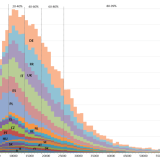
Dobre fungujúce a inkluzívne trhy práce
Dobre fungujúce trhy práce sú nevyhnutné pre úplné využitie potenciálu ekonomiky v súvislosti s vytváraním pracovných miest, ako vyplýva z finančnej a hospodárskej krízy. Kríza mala veľmi rôznorodé dopady na trhy práce v jednotlivých členských štátoch EÚ a niektoré skupiny, ako napr. mladí ľudia a osoby s nízkym vzdelaním, boli obzvlášť tvrdo postihnuté krízou. Rýchle prebiehajúce štrukturálne zmeny tiež predstavujú nové výzvy z hľadiska možného nedostatku pracovnej sily a nesúladu medzi ponúkanými a požadovanými zručnosťami v jednotlivých odvetviach a regiónoch.
Hlavným nástrojom EÚ na podporu zamestnanosti a sociálneho začlenenia je Európsky sociálny fond, ktorý pomáha ľuďom získať prácu, integrovať znevýhodnené osoby do spoločnosti a zabezpečiť spravodlivejšie životné príležitosti pre všetkých. K dispozícii sú aj rozmanité európske právne predpisy, ktoré upravujú práva pracovníkov na trhu práce. Európska komisia okrem toho v apríli 2017 zaviedla európsky pilier sociálnych práv. Pilier nadväzuje na sociálnu politiku a politiku zamestnanosti, ktoré dopĺňa s cieľom usmerňovať politiky vo viacerých oblastiach, ktoré sú nevyhnutné pre dobre fungujúce a spravodlivé trhy práce a systémy sociálneho zabezpečenia.
- Európska komisia: Európsky sociálny fond
- Európska komisia: Európsky pilier sociálnych práv




















